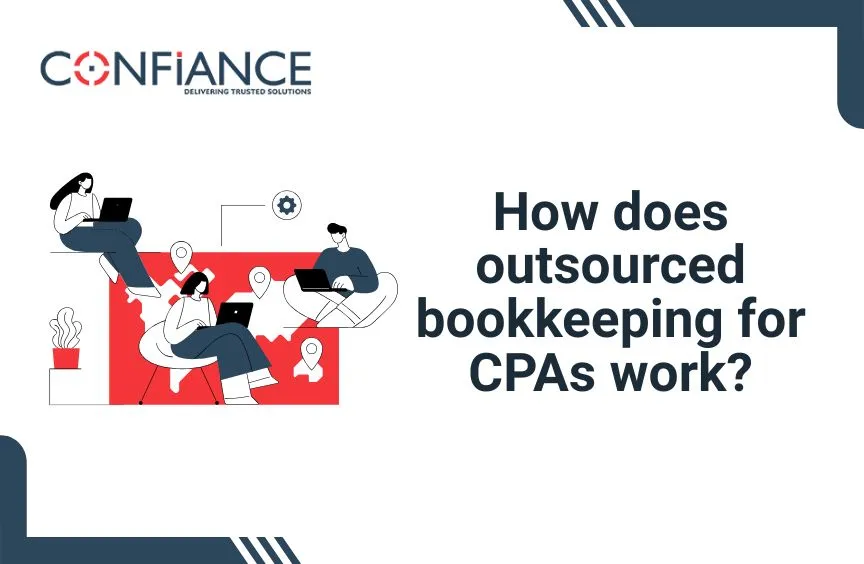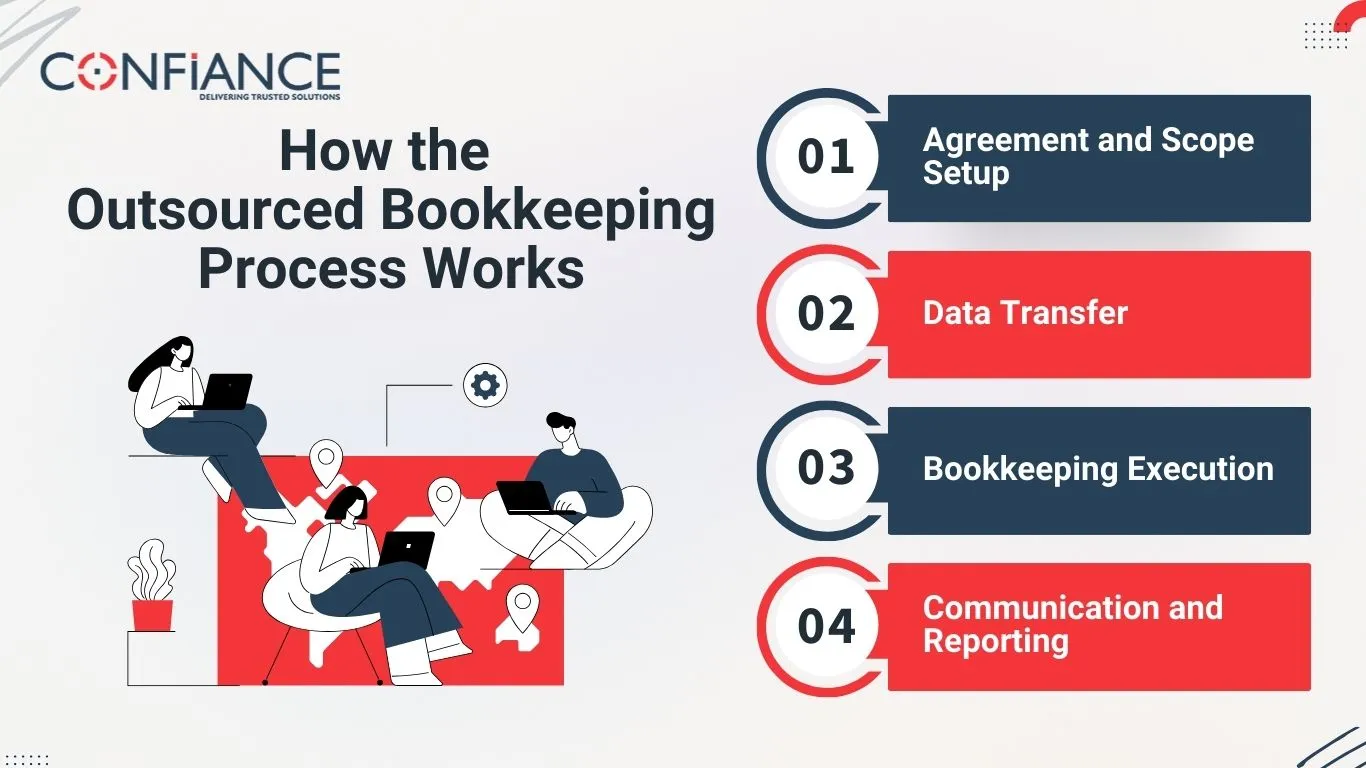
How does outsourced bookkeeping for CPAs work?
Bookkeeping is a core function for any accounting firm. But, sometimes they are too overwhelmed with these tasks in a way that cannot maintain accuracy. So, many CPAs now rely on outsourced bookkeeping for CPAs to manage client books with accuracy and speed. This approach helps firms save time, reduce staff pressure, and maintain organized financial records. But how does it actually work? This blog explains the full process and benefits in clear steps.
What is Outsourced Bookkeeping for CPAs?
Outsourced bookkeeping for CPAs refers to the process of hiring an external bookkeeping service to handle daily financial records for the CPA’s clients. Instead of doing every task in-house, CPA firms partner with a third-party bookkeeping team. This team acts as a quiet back-office unit. They update records, prepare reports, and help the CPA focus on tax filings, advisory work, and client strategy.
Why CPA Firms Choose Outsourced Bookkeeping Services
Lower Operating Costs
Outsourced bookkeeping for CPAs usually costs less than hiring full-time staff. The CPA firm pays only for the time and tasks completed. There are no extra office costs, training costs, or software costs. This creates predictable monthly expenses.
Improved Efficiency
A dedicated bookkeeping service works on this function all day. They use clear processes and strong tools. This makes outsourced bookkeeping for CPAs more efficient than a small in-house team who handles many tasks at once.
Better Use of Internal Staff
CPA firms can focus their skilled staff on tax planning, audits, and client consulting. The routine bookkeeping is completed by the outsourced team. This means CPAs get to use their skills for higher-level services.
How the Outsourced Bookkeeping Process Works
Step 1: Agreement and Scope Setup
The CPA firm speaks with the service provider to define the scope. They identify tasks like:
- Recording daily transactions
- Bank reconciliation
- Accounts payable and receivable
- Monthly financial statements
- Payroll support if required
A service plan is created. Both sides agree on timelines, privacy rules, and channels of communication.
Step 2: Data Transfer
The CPA firm provides access to accounting software or cloud files. Secure login credentials are shared. Some firms share scanned receipts and bank statements. Others provide direct bank feeds. The outsourced bookkeeping for CPAs team gathers all source documents.

Step 3: Bookkeeping Execution
The outsourced bookkeeping team updates all books regularly. They enter every transaction. They perform reconciliations. They categorize expenses. They track income. Every entry is checked twice to maintain accuracy. The CPA can review the books any time.
Step 4: Communication and Reporting
Most providers schedule weekly or monthly calls with the CPA. They share updated reports and ask for missing data if needed. Monthly reports include:
- Balance Sheet
- Profit and Loss Statement
- Cash Flow Report
The CPA firm reviews the books, prepares taxes, and advises their client accordingly. With outsourced bookkeeping for CPAs, this step becomes very smooth.
Types of Services Included in Outsourced Bookkeeping for CPAs
Transaction Recording
The bookkeeping team records sales invoices, purchase receipts, bank deposits, and payments. Each entry is posted accurately.
Bank Reconciliation
They match every entry with bank statements. This helps catch discrepancies early.
Accounts Payable
They monitor bills due for payment. They prepare payment schedules. Some even handle vendor payments as per the CPA’s instructions.
Accounts Receivable
They track client invoices. They send reminders. They maintain a clear aging report.
Payroll Support
Some outsourced bookkeeping for CPAs also manage time sheets and pay runs. They calculate simple payroll and tax withholdings.
Month-End Close
They finalize records at month end. Reports are prepared. The CPA gets clean data ready for review.
How Outsourced Bookkeeping for CPAs Helps Client Workflows
Faster Turnaround
CPAs can complete tax returns faster because books are already updated. There is no delay in waiting for missing bookkeeping.
Higher Accuracy
Bookkeepers focus only on the small details. This improves the accuracy of financial data. Fewer errors mean less time fixing reports.
Scalable Volume
CPAs can take more client work without hiring new staff. The outsourced team can handle more volume when needed. If the CPA gains more clients, the bookkeeping load is shared easily.
Communication Tools Used in Outsourced Bookkeeping for CPAs
Most tasks happen through secure cloud systems. Common tools include:
- QuickBooks Online
- Xero
- Zoho Books
- Google Drive or Dropbox
- Secure email or client portal
Calls take place through Zoom or Teams. Task trackers may be used for updates. This structure keeps things clear.
Is Outsourced Bookkeeping Secure?
Yes, it is secure if done correctly. Trusted providers use strong data encryption, firewalls, and secure servers. They also sign strict confidentiality agreements. The CPA firm controls access. Each file and login can have permission levels. This keeps client information safe.
When is Outsourced Bookkeeping Right for CPAs?
You should consider it if:
- Bookkeeping tasks take too much time
- You find it hard to keep records current
- You want to offer more monthly or quarterly services
- You want to scale your practice
- You want to improve profit margins
Common Challenges and How to Manage Them
Communication Delays
Solution: Set fixed check-in times and clear message timelines.
Data Transfer Errors
Solution: Use cloud-based accounting systems and shared drives.
Different Time Zones
Solution: Choose a team with overlapping working hours when possible.
With a clear process, these issues are reduced. That is why outsourced bookkeeping for CPAs has become a reliable option for firms.
Benefits Summary: Outsourced Bookkeeping for CPAs
- Saves time and reduces distraction
- Lowers staff costs
- Provides clean, current books
- Makes tax season smoother
- Helps CPAs serve more clients
Real-World Use Cases of Outsourced Bookkeeping for CPAs
Use Case 1:
- A small CPA firm handled 40 business clients.
- Two in-house staff managed tax filing and advisory work.
- Bookkeeping work kept piling up.
- They signed a plan for outsourced bookkeeping for CPAs.
- The team handled daily entries and month-end closing.
- The firm added 15 new clients within one year.
- Client satisfaction improved because reports were always ready on time.
- The firm saw better cash flow and stronger relationships with clients.
- They could accept more advisory projects with the time saved.
In summary, this use case shows how outsourced bookkeeping for CPAs helped the small firm grow without hiring more staff. It improved client satisfaction, allowed them to focus on higher-level work, and supported expansion smoothly.
Use Case 2:
- A mid-sized CPA firm was struggling during quarterly filing seasons.
- Their internal team worked overtime and still could not keep up.
- They outsourced bookkeeping for CPAs to manage posting, reconciliation, and payables.
- Within months, workload pressure dropped and deadlines were met.
- The outsourced team also prepared monthly management reports that helped the CPA firm offer advisory services to clients.
A mid-sized CPA firm struggled during quarterly filings. Their staff worked overtime but still fell behind. They outsourced bookkeeping for CPAs to handle entries, reconciliation, and payables. Workload stress decreased within months. Deadlines were met on time and the team returned to a normal schedule. The outsourced team also delivered monthly reports, which helped the firm provide advisory services to clients.
Use Case 3:
- A CPA practice specializing in construction clients often dealt with complex invoicing and job cost tracking.
- Bookkeeping mistakes affected reporting accuracy.
- They partnered with an outsourced bookkeeping for CPAs provider with industry experience.
- The bookkeeping team maintained accurate job cost entries, tracked expenses, and produced detailed reports.
- The CPA used these reports to offer better financial advice to clients.
- Client trust increased and the practice gained several referrals.
A CPA firm with construction clients struggled with complex invoicing and job costing. Errors in bookkeeping affected report accuracy. They chose an outsourced bookkeeping for CPAs provider familiar with the industry. The team handled job cost entries and prepared accurate reports. The CPA used those reports to give clients better advice. Trust improved and the firm received more referrals.
Use Case 4:
- A growing CPA firm wanted to offer virtual CFO services but had no time for basic bookkeeping.
- They outsourced bookkeeping for CPAs and assigned all daily ledger tasks to an external team.
- The CPA firm then offered financial forecasting, planning, and budget analysis to clients.
- The new service line increased revenue.
- Their outsourced bookkeeping team scaled with their client growth.
A growing CPA firm wanted to offer virtual CFO services but had no time for basic bookkeeping. They outsourced bookkeeping for CPAs and assigned all routine ledger tasks to an external team. This freed them to provide forecasting, planning, and budget analysis. Revenue increased and the outsourced team scaled with growth. It helped them launch premium advisory packages without adding any staff.
We can say that outsourced bookkeeping for CPAs has become a practical option for many accounting firms. It allows CPAs to focus more on planning and strategy, and removes much of the daily work that takes time. If you as a CPA or a CPA firm want to scale your business, start by outsourcing bookkeeping tasks to Confiance. With our strong processes, secure systems, and clear communication, we deliver outsourced bookkeeping services for CPAs that provide value.
FAQs
Q1. What is outsourced bookkeeping for CPAs?
Outsourced bookkeeping for CPAs is when a CPA firm hires an external team to manage client records. The team updates books, prepares reports, and ensures accuracy.
Q2. Why do CPA firms choose outsourced bookkeeping?
CPA firms choose outsourced bookkeeping for CPAs because it reduces costs and improves efficiency. It also frees staff to focus on tax and advisory services.
Q3. What services are included in outsourced bookkeeping for CPAs?
Services include transaction posting, reconciliations, accounts payable, receivables, payroll support, and month-end reporting.
Q4. How does outsourcing help client workflows?
Outsourced bookkeeping for CPAs speeds up record updates. It improves accuracy and allows CPA firms to handle more clients without hiring.
Q5. When should a CPA firm consider outsourcing?
It is right when bookkeeping tasks take too much time. It also helps when records are falling
